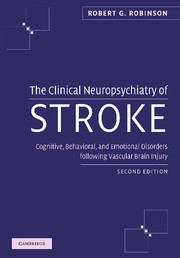 The Clinical Neuropsychiatry of Stroke
The Clinical Neuropsychiatry of Stroke Book contents
- Frontmatter
- Contents
- Preface
- Part I Introduction
- Part II Poststroke depression
- 5 Diagnosis of depression
- 6 Prevalence of depressive disorders
- 7 Phenomenology and specificity of depressive symptoms
- 8 Natural course of depression
- 9 Delayed-onset depression
- 10 Relationship to lesion location
- 11 Relationship of depression to cerebral dominance and structural asymmetries
- 12 Relationship of depression to bilateral hemisphere brain injury
- 13 Relationship of depression to physical impairment
- 14 Relationship to cognitive impairment and treatment
- 15 Relationship of aphasia to depression
- 16 Relationship of depression to social functioning
- 17 Relationship to premorbid risk factors
- 18 Mortality and treatment
- 19 Suicidal thoughts and plans
- 20 Biological markers
- 21 Mechanisms of poststroke depression
- 22 Treatment of poststroke depression
- 23 Prevention of poststroke depression
- Part III Poststroke mania
- Part IV Poststroke anxiety disorders
- Part V Other poststroke disorders
- Index
16 - Relationship of depression to social functioning
from Part II - Poststroke depression
Published online by Cambridge University Press: 01 October 2009
- Frontmatter
- Contents
- Preface
- Part I Introduction
- Part II Poststroke depression
- 5 Diagnosis of depression
- 6 Prevalence of depressive disorders
- 7 Phenomenology and specificity of depressive symptoms
- 8 Natural course of depression
- 9 Delayed-onset depression
- 10 Relationship to lesion location
- 11 Relationship of depression to cerebral dominance and structural asymmetries
- 12 Relationship of depression to bilateral hemisphere brain injury
- 13 Relationship of depression to physical impairment
- 14 Relationship to cognitive impairment and treatment
- 15 Relationship of aphasia to depression
- 16 Relationship of depression to social functioning
- 17 Relationship to premorbid risk factors
- 18 Mortality and treatment
- 19 Suicidal thoughts and plans
- 20 Biological markers
- 21 Mechanisms of poststroke depression
- 22 Treatment of poststroke depression
- 23 Prevention of poststroke depression
- Part III Poststroke mania
- Part IV Poststroke anxiety disorders
- Part V Other poststroke disorders
- Index
Summary
Social functioning has been recognized for many years to play an important role in development of depression associated with stress or negative life events (Brown et al. 1986; Henderson 1990). Furthermore, the effect of social support on psychological distress depends upon the nature of the supportive attachment. Among women in a community sample, for example, inadequate social support from a spouse was found to have a greater emotional impact than lack of support from a non-spousal relationship (Andrews and Brown 1988). Although an acute physical illness, such as stroke, can serve to mobilize social support from friends and family, patients who perceive their support to be inadequate may be more vulnerable to poststroke depression than patients who do not.
We have examined the relationship between poststroke depression and social functioning as measured by the social functioning exam (SFE) (Robinson et al. 1985a) and the social ties checklist (STC) (Robinson et al. 1985a) in several studies. The SFE was developed to quantify patient satisfaction with their social functioning both before and following a stroke. The SFE is shown in Table 16.1. It is a semi-structured interview in which the examiner, after asking one or several probing questions, rates each item on a 3-point scale: 0, indicates no difficulties, 1, indicates moderate difficulties, and 2, indicates severe impairment.
- Type
- Chapter
- Information
- The Clinical Neuropsychiatry of StrokeCognitive, Behavioral and Emotional Disorders following Vascular Brain Injury, pp. 179 - 193Publisher: Cambridge University PressPrint publication year: 2006


